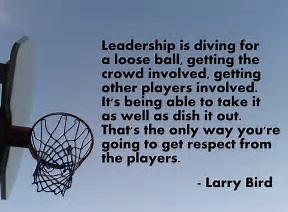 It’s Sweet Sixteen time in the NCAA Men’s basketball tournament. By now, some favorites have already been sent home, and some underdogs are preparing for the fight of their lives. At this stage in the tournament, the competition is stiff and teams are more evenly matched by their win/loss records. The pressure felt by players and coaches is immeasurable, but out of the stress, 8 elite leaders will rise.
It’s Sweet Sixteen time in the NCAA Men’s basketball tournament. By now, some favorites have already been sent home, and some underdogs are preparing for the fight of their lives. At this stage in the tournament, the competition is stiff and teams are more evenly matched by their win/loss records. The pressure felt by players and coaches is immeasurable, but out of the stress, 8 elite leaders will rise.
Here are a few leadership lessons from March Madness:
- You won’t have a championship team every year. Duke, North Carolina, Kentucky, Kansas…those basketball programs and their coaches have become synonymous with March Madness. We expect those teams to compete aggressively and successfully overcome their competitors in each round. But, this year Duke will be watching the rest of the games from home. And the winners of the 2016 NCAA tournament went home in Round 2 this year. Even seasoned, great leaders with extraordinarily talented teams will lose. There are no guarantees in competition. You bring your best strategy, preparation, and heart to the table, but that doesn’t always translate into success. Winning doesn’t guarantee future success, and losing does not define your future either.
- How you deal with a loss is everything. Whether the team is down by 2 or by 20 with 1 minute left, great coaches refuse to let their team give up. They may not play the odds by fouling on each play, but they expect their players to hustle and make smart moves even if a loss is imminent. And when the game is over, they gracefully accept defeat, congratulate the opposing coach, and acknowledge the hard work displayed by the other team. Powering through the heartache of defeat by congratulating the winners is a true sign of character.
- Great leaders learn from their mistakes. No matter how open the wounds are, great leaders don’t go into hiding after a tough loss. They head straight to the film room to analyze what went according to plan and what strategies failed. With the anguish of the loss still fresh, it takes courage and strength to take ownership of the errors each player/coach made along the way. If we fail to learn from our own mistakes, we are doomed to repeat them.
- Not all A-teams are full of A-players. While each team recruits McDonald’s All-American players (the best high school basketball players in the US), there are only so many All-American players to go around. Never underestimate a team with average players. Average players with strong fundamentals, high energy, stamina, and determination can overcome the inflated ego of a high performer any day.
- Know your strengths and weaknesses. The same strategy will not product the same results in every situation. When you know your (and your team’s) strength and weaknesses, you can identify the correct match up for the skill needed and skill possessed.
- Lead by example. All eyes are on you. If you’re a leader that shows up first to practice and is the last one to leave, your team members will know that you believe practice is vital. If you lose your cool when the odds are stacked against you, your team will mimic your behavior. The team culture is set from the top. Be the leader that rises above stress and negativity, and your team will rise with you.
In the field of 64 teams, only 1 leader will experience that “one shining moment” in 2 weeks. The rest will experience great learning lessons and start working immediately to come back wiser and stronger.
“Failure should be our teacher, not our undertaker. Failure is delay, not defeat. It is a temporary detour, not a dead end. Failure is something we can avoid only by saying nothing, doing nothing, and being nothing.” – Denis Waitley
